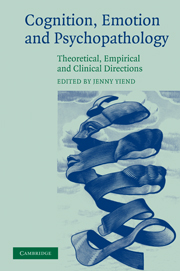Book contents
- Frontmatter
- Contents
- List of contributors
- An introduction and synthesis
- Andrew Mathews: a brief history of a clinical scientist
- Part I Theoretical approaches
- Part II Empirical directions
- 5 Habits of thought produce memory biases in anxiety and depression
- 6 Anxiety and the resolution of ambiguity
- 7 Dissociating fear and disgust: implications for the structure of emotions
- 8 The causal status of anxiety-linked attentional and interpretive bias
- 9 The experimental modification of processing biases
- Part III Clinical perspectives
- Index
5 - Habits of thought produce memory biases in anxiety and depression
Published online by Cambridge University Press: 23 November 2009
- Frontmatter
- Contents
- List of contributors
- An introduction and synthesis
- Andrew Mathews: a brief history of a clinical scientist
- Part I Theoretical approaches
- Part II Empirical directions
- 5 Habits of thought produce memory biases in anxiety and depression
- 6 Anxiety and the resolution of ambiguity
- 7 Dissociating fear and disgust: implications for the structure of emotions
- 8 The causal status of anxiety-linked attentional and interpretive bias
- 9 The experimental modification of processing biases
- Part III Clinical perspectives
- Index
Summary
Explanations of the mental lives of emotionally disordered people are sought by coping with special challenges. Although we can predict differences on a variety of cognitive tasks, we cannot – or should not – gain complete experimental control of the conditions that seem to produce those differences, the anxious and depressed states. Toward the goal of characterizing differences, Andrew Mathews and his colleagues have accumulated several decades of evidence about the cognitive processes associated with anxiety, occasionally distinguishing them from those associated with depression. And recently they have done the next best thing to gaining control of emotionally disordered states, by experimentally establishing in non-anxious people the kinds of biases observed in the performance of naturally anxious people (see Macleod et al., this volume, and Yiend & Mackintosh, this volume – Ed.). In this chapter, I report results that extend the effects of training interpretive biases to performance on a subsequent test of remembering. Biased or mood-congruent memory (MCM), however, is much more typical of depression than anxiety. Therefore, the report of this simulation of MCM sets the stage for reconsideration of the distinction between anxiety and depression with respect to biases in remembering – a distinction that corresponds to different personal concerns and habits of thought. Through viewing memory biases as the product of cognitive habits, it is possible to question the implicit assumption in much of the literature on emotionally disordered memory – that emotional aspects of anxiety or depression are responsible for biased recall.
- Type
- Chapter
- Information
- Cognition, Emotion and PsychopathologyTheoretical, Empirical and Clinical Directions, pp. 109 - 129Publisher: Cambridge University PressPrint publication year: 2004
- 6
- Cited by



